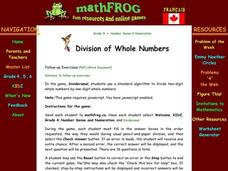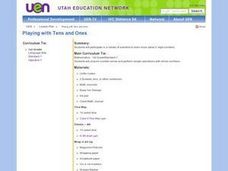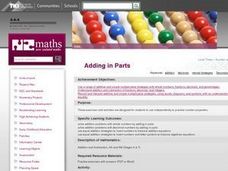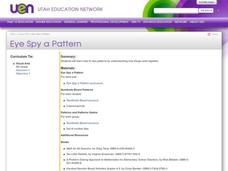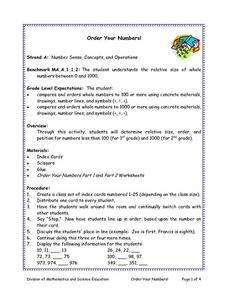Curated OER
Comparing and Ordering Whole Numbers
In this math worksheet, students compare and order whole numbers. They apply the skill to the other word problems and determine least and greatest values.
Curated OER
Adding Tenths
In this mathematics instructional activity, 4th graders identify what is missing from the whole 1 in each problem. Then they draw a number line from 0 to 2 with tick marks at every tenth place. Students also add each decimal and write...
Curated OER
Worksheet Chapter 1, 1.2-1.8 College Prep Algebra
In this algebra worksheet, students complete a variety of basic algebra problems. They compare integers, identify sets of numbers, simplify equations, translate words into numerical expressions, and identify properties. This worksheet...
Curated OER
Division of Whole Numbers
Students divide two-digit numbers by one-digit whole numbers. Using a specified website, they play complete standard division algorithms. Students receive immediate feedback on the website. In addition, they complete problems on paper.
Curated OER
Corn Field Math
Learners complete problems dealing with whole numbers, fractions and percents. After exploring the history of corn and related farming vocabulary, students work in pairs to solve multi-step problems. They incorporate the use of number...
Curated OER
How Many Ways Can You Represent a Number?
Students participate in monthly scaffolded lessons that focus on working with whole numbers from 1 to 10. They work with tiles on exploration mats, number tile mats, and a number representation book. Each month they complete activities...
Curated OER
Playing with Tens and Ones
First graders complete a number of activities that increase their number sense and use of simple operations. They use dice and worksheets to make two-digit numbers and to record them, they count by tens and ones, and order numbers using...
Curated OER
Addition/Subtraction Strategies
Third graders recall all their addition and subtraction facts to 20. They use the relevant number strategy with whole numbers. Students are taught place value in relation to decimals, and identify 'which decimal is larger.' They...
Curated OER
Adding in Parts
Third graders are able to split whole numbers into parts. They make numbers up to a tidy number. Students add and subtract tenths to make a decimals number into a whole number. They are able to add whole numbers up to three digits.
Curated OER
Whole Number Game Time
First graders play math games to develop a better understanding of whole numbers. They represent and use whole numbers up to 100. They estimate how many times they would have to roll two dice before they would get to 100 and record...
Curated OER
Eye Spy a Pattern
Fifth graders examine how to see patterns by showing how things work together. They identify, analyze and determine a rule for predicting and extending numberical patterns involving operations of whole numbers, decimals and fractions.
Curated OER
Order Your Numbers
Students examine the order of whole numbers that range from 0 to 1,000. They compare and contrast the quantities of different numbers using the number line, objects, and symbols of comparison. Students also work as a class with cards to...
Curated OER
Subtraction
First graders write and illustrate a story for a subtraction problem subtracting from the number ten. Students explore subtraction situations by using counters to represent a familiar number- based literature selection. Students role...
Curated OER
Trading Pennies and Dimes
Second graders, while in the computer lab, explore the strategy of making and grouping to ten. They assess how to trade pennies for dimes and create original word problems along with corresponding number sentences to illustrate grouping...
Curated OER
Finding PI
Students select and use appropriate operations, methods and tools to compute or estimate using whole numbers. They develop and use formulas for determining the circumference and area of circles. Students determine and describe the...
Curated OER
Understanding Place Value
Fifth graders study place value. After forming teams, they play a game called, "Who Can Line Up the Number." Students observe numbers in expanded form and place representative digits in the correct order.
Curated OER
Number and Number Relations: Lesson 2
Fourth graders participate in using the terminology of more, less, between, compare, and order. They compare whole numbers and use the symbols for <, >, =. They order whole numbers and practice with problems where they use this...
Curated OER
Number and Number Relations: Lesson 3
Eighth graders compare whole numbers and decimals. They use symbols for <, >, =, and order whole numbers and decimals. They practice the meaning of positive and nugative integers by using them to describe real-world situations.
Curated OER
The Multiplier (small 2-digit by 1-digit numbers)
Second graders study digits in 2- or 3-digit whole numbers. They write and solve story problems which involve whole numbers, using addition, subtraction, multiplication, or division.
Curated OER
Arrays Hooray
Second graders write and solve story problems which involve whole numbers, using addition, subtraction, multiplication, or division. They solve multiplication problems by using strategies other than counting all. They interpret and solve...
Curated OER
To Be (Half) Or Not To Be (Half)
First graders demonstrate various ways to represent and verify a whole or set separated in two, three, or four equal parts. Using interlocking cubes, Students model a part of a whole or a part of a set. They use appropriate tools and...
Curated OER
Divide and Conquer
Seventh graders analyze responses to different types of problems. Using pictures and diagrams, they explore and model the division of fractions. Students examine situations that call for division whether with the whole numbers or with...
Curated OER
Percent Box
Students examine the procedures to determine a number when the percentage of the whole is known or to find the whole number when the part or percentage is known.
Curated OER
The Long and Short of It
Fourth graders play a variety of ordering games to identify place value in whole numbers and decimals. They consider the importance of place value in dealing with money.





